Harvest Boon
- Nov 23, 2019
- 6 min read
Updated: Apr 24, 2022

My visit to Fossacesia this fall was full of wonderful surprises. The surprise of having friends here who only months ago were strangers and moved quickly into confidantes. The surprise of having needed to set my alarm for coffee dates and road trips. The surprise of having been treated to three home-cooked meals cooked in someone else's home by someone else. But there was one particular surprise that allowed me to check something off the list in the bucket I call my head...
I had to set my alarm to be on time to pick olives!
I was lucky enough not only to have a friend who owned olive trees, but to have hit prime olive-harvest time in Fossacesia.
Anna invited Daniela (both of whom you may have met in another post) and me to help harvest olives from a grove right in town that she and her partner Lucca have taken possession of. (Yes, I know. Preposition dangling at end, like an olive.) Members of her large Arrizza family own much larger groves in the “country“ just outside of town, so were happy to have the couple take this one over.
I jumped at the opportunity to get my hands dirty in such a way.

We knew we’d be harvesting sometime between Friday and Sunday, but had to wait to see how the days dawned. Olives picked in rain or even post-rain dampness apparently will begin to ferment immediately, dashing any hope of good oil. Friday and Saturday proved wet, so Sunday, November 3rd was the big day.
I had romantic if slightly Steinbeckian visions of myself perched on a centuries-old ladder with a big, floppy straw hat atop my sweaty head, weary and aching of back but toiling on. Turned out our work involved no ladder but a rake, and little more than an aggravated neck. (And I don’t need to be picking olives to have that. I’d have that if I were being served an olive tapenade on toast while reclining in a recliner.)

At about 10:30 Sunday morning, we got started. We put nets down to surround the first tree and began raking its branches.

We expected an abbacchiera, an apparatus that shakes the fruit loose from the top branches, to arrive any minute. It never did arrive, and we harvested what we could, but had to leave some fruit on the upper branches.
When you’re finished with a tree, you roll the fruit-heavy nets into a kind of funnel and pour the captured olives into a crate.
Anna, who has embraced her roots with relish and had put in the time to earn her olive oil judging certification, passed on a few tidbits:

-Italy is the world’s queen of olive diversity. There are 500 types of olive trees in Italy, an average of 25 per region. About half the cultivars (the olive equivalent of wine’s varietal) of the world are in Italy.
-Trees in this grove are Gentili di Chieti, identifiable as such because their leaves grow upward. Many others' grow downward like weeping willows.
-Each of the trees in this small grove can yield up to three liters of oil.
-Trees can fall prey to many kinds of maladies, olive flies, and molds.

-Trees like this one that look like they’re splitting at some point might do just that and become two trees. In fact, if you find two that are unusually close to one another, you might not be wrong in guessing they were once one.
After a few hours, we took a short break to set a spell and drink some beer. (Beer really does slake a thirst when you’re working outside. Why does it taste so good then and so very vile at any other time?) While we sat, Anna -- who's expecting and couldn't join us in a beer -- disappeared and returned with some newly processed oil from one of her extended family’s larger groves, together with a few glasses. (Larger groves' trees can be harvested a bit earlier because they tend to be expertly pruned for optimum sunbathing.) She gave us a cool lesson in tasting oil for Extra Virgin (EVOO) quality. Here it is:

-First, you pour a small amount in a glass and cover the glass with one hand while you warm it from the bottom with the other.
-After you’ve warmed the oil, you put your nose right down into the glass as you would with wine and fill your nostrils with the scent of it.
-Then, you slurp about a half teaspoon in with air and roll it around your mouth and teeth and cheeks to get your whole tongue coated before swallowing, making faces and creating sucking sounds as you work the air and oil around.
-Then, you do it again. On the second round, true EVOO should burn your throat and cause a small cough.
It did.
I promised Anna I wouldn’t film her slurping and contorting her face, so I later filmed myself doing it.
What I find so curious is that the catch in your throat happens on the second swallow and never on the first. I’ve tried it several times now, and that’s always the case. I'll have to ask why.
Another thing Anna told us to notice is whether the oil has left a slick, lip-glossy feeling on your lips. Apparently, that’s a telltale sign the source olive trees had been hit by olive flies.
To my taste, Fossacesia produces outstanding olive oil— lightly fruity, smooth, green-tasting. Anna more precisely calls it “grassy.” I should note, though, that the above is not a test for any particular flavor, but for quality of an oil in terms of low acidity and character of the source olives.
We broke for lunch at around 2pm and were guests of Anna and Lucca in their nearby home. Their long farmhouse table was the kind of Italian table you like to picture yourself seated at.

The multi-course meal included a terrific arrabbiata, a salad of lettuces and fennel from their friend Marco’s garden nearby (dressed with olive oil, natch), Montepulciano from a local winery, pastries from a local bakery, and the last figs of the season. We finished with a liqueur called Rose Gin which Anna and Lucca had bought near Niagara Falls.
By the time we headed back to the grove, I wondered how I was going to “work the fields” with wine and gin swimming in my system. Turned out I’d found my raking arm, and went after those olives with the strength of Popeye.
I’ll just let that one sink in for a minute.
When the sun started to go down, we wrapped it up and brought our olives to the frantoio to be processed.
Olives need to be processed immediately after they're picked. Because pickers work by daylight, frantoio folks work through the nights. And since many other small producers had also spent Sunday picking, there was an evening rush at the frantoio. As Anna colorfully put it, the place was like an ER.
They take everybody’s olives in order of arrival. Ours were in line behind some others, so we were invited politely to take a look at the process they’d pass through and then get out of the workers’ hair.
Here’s what happens:
First, a thresher separates fruit from leaves. There's Lucca pushing our lot into the thresher.
Next, the fruit is pressed into a soupy glop as in a giant-sized KitchenAid.
That glop is emulsified in a kind of whipping machine, then passed through a centrifuge to separate the oil from the detritus.
My photos of those machines were a bust, so I'm including one of "the three amiche" for no really good reason other than my desire to say "the three amiche."

Finally, the oil (green gold, Italy tea!) pours out and gets packaged into each property’s designated containers. (Most small producers' oil isn't bottled for the marketplace.)

En route, the oil can be passed through a paper filter or remain unfiltered. Unfiltered oil is prized by some for its rich, earthy taste. The down side is it only lasts one month or possibly two because the sediment starts to spoil. Filtered olive oil lasts longer, but is best used within a few months for optimum taste because small bits of sediment eventually will invade the oil.
Alas, our oil couldn’t be processed and packaged by my 10am next-day departure for Rome, so I wouldn’t be carrying home a sample of the fruits of my labor. In fact, I couldn’t beg or buy any of the new season’s local oil from other small producers because most, like ours, were still being processed or bottled.*
No matter. Anna has already sent a photo of one of the tins she’s holding for me!

*My friend Gail called me the next morning to say she and her husband had just received nine bottles of olive oil from friends in town and would I like some. I got the call while I was aboard the pullman to Rome.









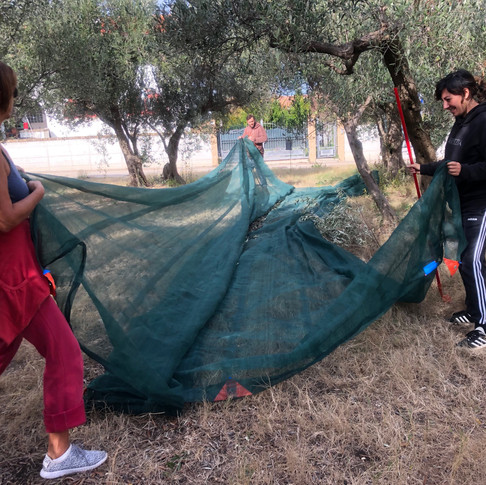

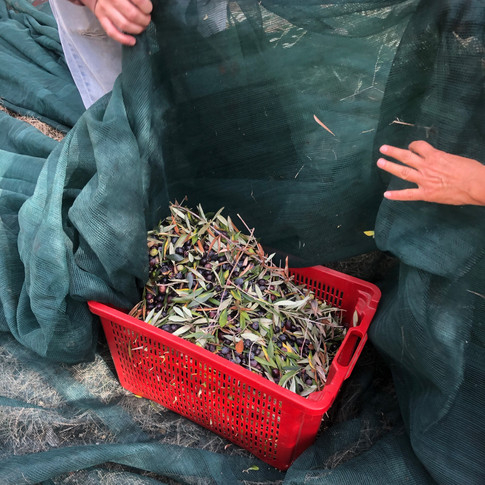

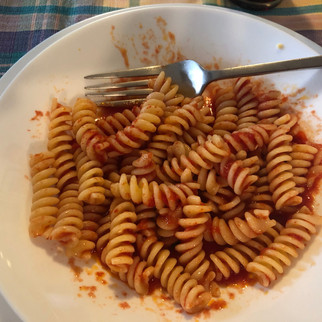





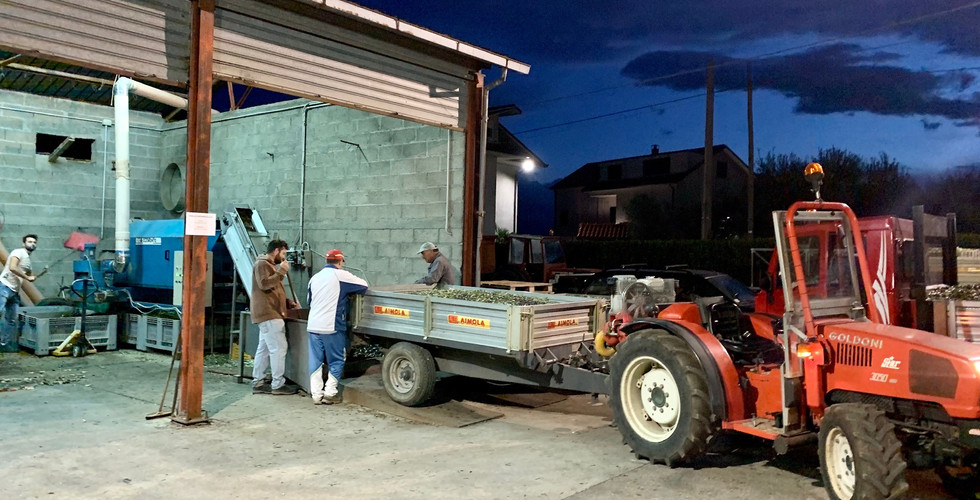



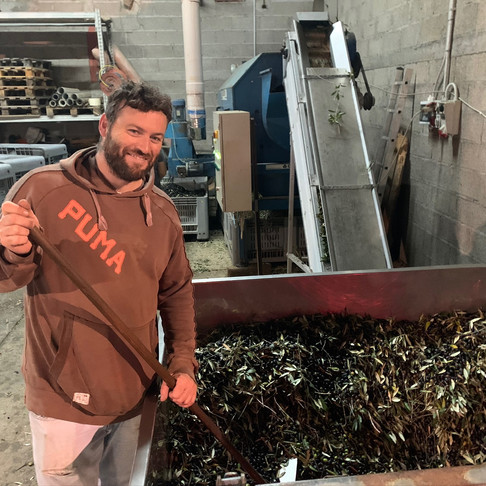







Comments